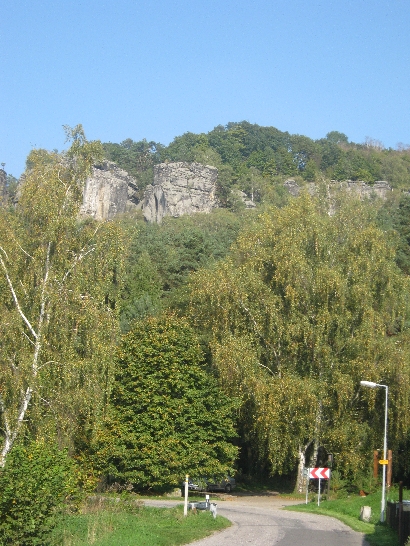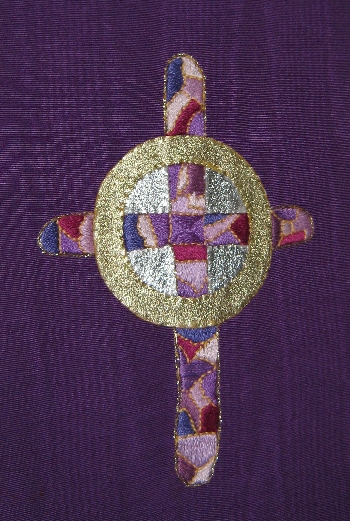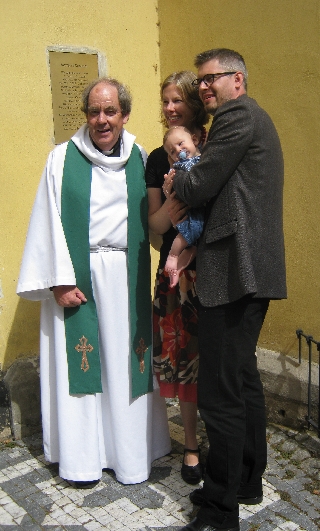
Yesterday, I officiated at the burial of ashes of two people, a husband and wife, into the family grave. Whilst this is something I would quite regularly do when Rector of a group of North Oxfordshire villages, this was the first time of doing so in just over six years of ministry here in the Czech Republic. I have also only conducted four funerals during that time, a reflection of the predominantly young age of the English-speaking expatriate population resident here.
However, although I conducted yesterday’s graveside service in English, it was very much a Czech occasion and was an illustration of several aspects of Czech life and culture. And because I want to protect the privacy of the family, I hope readers will forgive me for not referring to people or exact locations by name.
The existing family grave is located in the massive Olšanské Cemetery that lies in the Prague suburb of Žižkov. Whilst the cemetery is well-maintained by the local authority, like so much of Czech officialdom, it is not managed to encourage the practice of religious faith. Two things illustrated this.
The first was the attitude of the two cemetery staff who were present when we arrived at the grave. Whilst the grave had been opened and the appropriate hole dug, in true Czech bureaucratic style, the only thing that mattered to them was thoroughly checking the paperwork brought by the next of kin, the son of the deceased. Once they were convinced that the paperwork was in order, they just left us to it with a, ‘we’ll be back later to fill in’.
The second was the complete lack of provision for me. There was no chapel or vestry where I could robe & leave my belongings securely. Instead, aided by the eldest grandson of the deceased, who kindly held various things for me, I robed standing alongside a bench adjacent to a path running behind the family grave.
I have previously written about the Czech love of flowers which helps to keep innumerable flower shops and stalls in business. This love was very clearly in evidence with every family member arriving with a bunch of fresh flowers to lay on the grave. And I mean everybody, right down to the six great-grandchildren of the deceased.
However, it was what followed the graveside service which struck me as being so much part of Czech culture. The service was at 11.00 in the morning, so afterwards, everyone who attended was invited back to lunch. But lunch was not at the family flat in Mala Strana where I’d met the next of kin the previous day. Nor was it at a restaurant, not so far from the cemetery. No – we were all transported over thirty kilometres out of Prague into the Bohemian countryside, to a large three storey house – the family chalupa.
The house was built in the early 1930s, in a time that is now always referred to as ‘the First Republic’, when Czechoslovakia was an independent state between 1918-1938. The deceased couple were responsible for having it built.
The history of the house reflects the history of the nation. During the Second World War, when the country was occupied by the Nazis, there was a German military base nearby, so the house was commandeered to house a senior Nazi military officer. Then, following the communist coup of February 1948, the family were confined to the basement whilst the two floors above were occupied by others. Even after the Velvet Revolution of 1989 and the subsequent restitution of property laws, the family allowed a remaining ‘tenant’ to live in part of the house, until her death in the mid 1990s.
The son of the deceased gave a speech in which he recalled his childhood weekends and summer holidays, spent living in the basement and sleeping in a wooden ‘summer house’ in the garden. They were memorable times, despite the deprivation of the communist era.
And although he and his parents escaped to Switzerland in 1968, when he was in his late teens, and he, along with his wife and three of their four children, now live in England, this house in the Bohemian countryside is still the family home. Here, where his elderly uncle still lives, is where the soul of the family resides and was the only place where the lives of his late parents, who both lived into their nineties, could be properly celebrated.
The story of this family, could be told with some variations, by so many Czech families. The story also reflects the psyche of the wider Czech nation – that deep down Czech people believe that the soul of the nation is found in the forests, rivers and lakes of the Czech countryside. Even whilst we were eating our lunch yesterday, Má vlast, ‘My Country’ or ‘My Fatherland’ by Bedrich Smetana, was being played in the sitting room, music that encapsulates that very concept.




Fascinating insight Ricky and so nice to learn a little more of the culture and tradition of this wonderful country.
Thank you for sharing your experiences in a way that really brings them to life !
Thank you Paul, for your appreciative words and for commenting here.
Yes, Thank you Ricky for sharing both your experience and your insights.
Thank you Michael, and thanks too for commenting here.
This so resonates with the experience of my own Czech side of the family, and with my experience with them and friends since I first moved to the country in 1984 – the Orwell year! The Czech countryside, and the world of the chalupa, has always been the refuge and healing place for the Czechs in the hardest of times – the place where they could breathe freely, and talk freely, and be themselves. You succeeded in making me homesick, Ricky – I had tears in my eyes.
Hello Meira! Thank you so much, for affirming what I wrote in this post. As you are someone who has far more intimate Czech associations, I take you comment here as a great compliment.
Hi Ricky,
Thank you for a very interesting post. In rural Ireland we still, to a large extent, have the communal rituals around death where the deceased will be ‘waked’ at home and visiting friends, family, etc, will be ‘fed and watered’, and even, in the case of a mourner coming from far away, given a place to sleep by the neighbours and almost the entire community will attend the funeral rites and burial. In our cities and urban areas this practice is quickly dying out in recent times but everywhere there would be a welcome and a helping hand for mourners and always provision made and assistance given to officiating clergy of whichever faith. Many will poke fun at our ‘quaint Irish rituals’ but I feel there is much to be said for the involvement of the community at this sad time as it gives the mourning family a sense of support and fellowship.
It is interesting too how much the family home features in all cultures as a centre for memorial and remembrance. It is the font of our shared history regardless of how scattered our families become with passing years and added generations. The Czechs are wise to centre their culture in nature and maintain their links with creation in that way and what better piece of music could you have to celebrate that link than Smetana’s beautiful masterpiece. Thank you again Ricky, regards, Sean.
Hi Sean,
Thank you for this most thoughtful comment. I very much concur with all that you say here. I would never poke fun at what you refer to as ‘quaint Irish rituals’. My post was my attempt to put into words my observation of Czech family and cultural traditions.
My only criticism was the lack of any provision being made, or assistance given, to me as the officiating priest. As you describe would happen in Ireland, so was my experience when first ordained in England. For the first three & half years after my ordination, I was the Curate of Hoddesdon in Hertfordshire. If a family wanted a burial, then it had to take place in the local authority cemetery as our churchyard was full. Whenever I officiated in the local authority cemetery, the staff were highly professional and went out of their way to help me & to cooperate. The contrast with the staff of Olšanské Cemetery could not have been greater.
Hi Ricky,
Forgive me not making my point more clearly, I never meant to imply that you would make fun of our rituals, in fact most of those who do so are themselves Irish. Sorry for any confusion I may have caused.
Hi Sean – No confusion caused! I didn’t take your remark that way at all. There’s no need to apologise.
This is fascinating… I love hearing or reading stories about the history of Czech families. This experience must have really brought you a lot of insight into Czech culture and history- a great opportunity. I definitely have noticed the love of flowers for every and any occasion! Even if it’s just a lunch at a cousin’s house or something unassuming. You can’t go wrong with flowers!
Thank you, Cynthia! The experience very much confirmed what I already knew more generally about Czech culture & history but illustrated my knowledge with a very personal example.
Yes – flowers for every occasion as you rightly say. However, a bouquet should always have an odd number of flowers in it – a another cultural quirk to be aware of 🙂
A very poignant post, Ricky! What an amazing story that family has, and how interesting to read about the facilitation of a Czech funeral. Loved the last paragraph of your post about the soul of Czech culture and Smetana… just beautiful.
Thank you for your appreciative comment, Em. As I wrote, this particular family’s story would find echoes in the lives of many other Czech families, be it the impact of the Nazi occupation &/or the communist era. But the whole day did give me a real insight into Czech life & culture.
A lovely post, Ricky, full of fascinating insight into Czech life and culture and giving a very vivid picture of this important family event. Like Em, I particularly loved the last paragraph and hope that this sense of being rooted in the countryside can be preserved in our rapidly-changing world.
It has been very satisfying to have so many appreciative comments regarding this post. It took a lot of time to try and articulate fully what I experienced and observed that day. Whilst the world is rapidly changing, as is the Czech Republic which will mark the 25th anniversary of the Velvet Revolution in a week’s time, fortunately the sense of being rooted to the forests and rivers of the countryside, still remains strong in the Czech psyche.
The story of the family house reminded me of others in that vein. We don’t have a story like that ourselves and don’t have a house in the country, but there still are stories of e.g. visiting relatives who lived in a village… I hope that link to the country won’t be broken; it’s definitely something very Czech.
I’m thinking Olšanské hrbitovy and other large cemeteries may be worse in respect to accommodating the service than a small town cemetery would be… more impersonal. But you do hear mostly bad things about the funeral “industry”; it’s the area where the overwhelming agnosticism and cynicism of this country really shows. 😛
Like you, Hana, I too hope the link to the country won’t be broken – it’s a wonderful Czech characteristic. However, your comment regarding ‘the overwhelming agnosticism and cynicism’ of the ‘funeral industry’, is I’m afraid, sadly true.